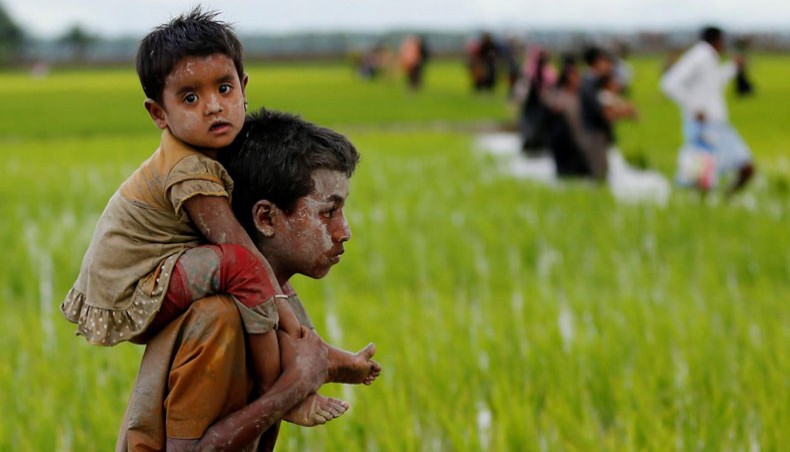SIX MONTHS OF INFLUX Rohingyas continue entering Bangladesh
No end to Rohingyas entering Bangladesh to flee persecution in Myanmar is in sight as the ethnic minority people continue to seek safety in Cox’s Bazar even six months inside the beginning of the influx on August 25, 2017.
Scores of Rohingyas staying in the no-man’s land near Tombru of Naikhyangchari upazila of Bandarban are also entering different camps in Cox’s Bazar despite Myanmar’s assurance that steps would be taken to stop exodus.
Rohingya exodus from Rakhine state continues as the ethnic minority people are facing acute food crisis and lack of security in their homeland and as they have no trust in Myanmar government over their safe and sustainable repatriation, Rohingya community leaders said.
Continued arrival of Rohingyas is aggregating the inhuman condition of Rohingyas living in overcrowded camps and settlements in Cox’s Bazar, having paltry shelter, sanitation and health facilities for them.
At least 537 Rohingyas entered Bangladesh in the past one week, Teknaf upazila senior fisheries officer Delwar Hossain, responsible for keeping account of new arrivals, told New Age, adding that 85 Rohingyas entered Bangladesh till 4:00pm on Saturday.
According to foreign ministry officials, about 2,100 Rohingyas entered Bangladesh in February.
‘Arrival of Rohingyas in Bangladesh has not stopped,’
refugee relief and repatriation commissioner Mohammad Abul Kalam said. ‘Rohingyas are saying that they are coming to Bangladesh as they are facing food crisis and lack of security back in their home.’ he said.
‘Continuation of Rohingya arrivals gives us one signal that Myanmar is either failing to stop or not stopping them from coming to Bangladesh,’ he said.
The Bangladesh government and international community continue struggling to cope with the situation as over 6.88 lakh Rohingyas have so far entered Cox’s Bazar since August 25, 2017 making it one of the biggest humanitarian problems of the world.
Many Rohingyas taking shelter at the world’s biggest refugee camp in Cox’s Bazar or outside the camp were living in inhuman condition. They are putting immense pressure on water and health facilities as well as local markets.
‘We along with international humanitarian agencies have been trying our best to face the situation,’ Abul Kalam said.
The new influx began after Myanmar security forces on August 25, 2017 responded to Arakan Rohingya Salvation Army’s reported attacks by launching a violence that the UN denounced as ethnic cleansing.
Officials estimated that the new influx increased the number of Myanmar people living in Bangladesh to 11.07 lakh.
Bangladesh and Myanmar signed three deals on November 23 and December 19 in 2017 and January 16, 2018 for setting modalities of physical arrangement for partial repatriation, subject to verification by Myanmar authorities, within two years of transferring the first batch of about 7,73,000 Rohingyas.
Bangladesh, in a meeting between home ministers of the two neighbours in Dhaka on February 16 stressed the need for an immediate end to the continued Rohingya influx and return of over 6,000 Rohingyas staying along the zero line of the border.
The Myanmar side assured of taking steps to stop the continued influx, home minister Asaduzzaman Khan said after the meeting.
Rohingya community leaders said that the ethnic minority people continued leaving Myanmar as they had no trust in Myanmar government’s arrangements for their repatriation and they faced lack of food and security.
Rohingya community leader Nurul Amin alleged that Myanmar army, border guards and others morning set fire to several houses in Rakhine state on February 20.
UN migration agency International Organisation for Migration said in a statement on Saturday that even inside six months of the beginning of influx of about 7 lakh Rohingyas into Bangladesh, conditions in the camps remained desperately over-crowded and far below any kind of international standard for acceptable living conditions.
‘What was once a forested nature reserve is now a vast sea of tarpaulin and bamboo shelters, built on denuded hills that will rapidly turn to mud during the monsoon season,’ it said.
‘People in the local community, many of whom live in severe poverty themselves, have had to cope with significant upheaval in their daily lives: From major hikes in food prices and firewood shortages, to over-stretched infrastructure and the loss of schools and other buildings which were co-opted during the emergency,’ read the statement.
‘Work has started to create wells in the south of the district where water is often scarce, provide new health facilities and support to existing ones, and begin livelihood opportunities around these and other efforts that will bring benefits to the host community as well as the refugees. It said.
News Courtesy: www.newagebd.net











